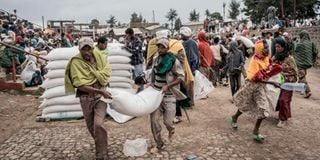Premium
Africa’s season of pain will end soon

In this file photo taken on September 15, 2021 Men carry a sack of wheat during a food distribution by the World Food Programme (WFP) for internally displaced people (IDP) in Debark, 90 kilometres of the city of Gondar, Ethiopia.
What you need to know:
- The words “failed state” are bandied around extravagantly these days in discussions about Nigeria.
- Unthinkable until a few years ago, South Africa is also routinely put in the “failed state” column these days.
Just when it seemed that it couldn’t get worse, Nigeria’s security crisis plunged further into perilous territory on the weekend. Terrorists attacked communities in the country’s North Central Plateau state, killing more than 82 people.
On March 28, terrorists attacked a train travelling from Nigeria’s capital Abuja to Kaduna in the north, killing eight people and seizing nearly 170.
Terrorists, armed herdsmen, and all manner of bandits on motorbikes and horses have been spreading mayhem, and for those who survive, quite a few are likely to be kidnapped for ransom.
The words “failed state” are bandied around extravagantly these days in discussions about Nigeria, with several people arguing it is a mild characterisation.
But it is part of a broad African crisis engulfing many of Africa’s largest countries, and what 10 years looked like economies that were set to sit at the global table with other moneyed powers.
Unthinkable until a few years ago, South Africa is also routinely put in the “failed state” column these days. Violence, crime, rape and other unmentionable atrocities against women, corruption, incompetence, increasing xenophobic attacks against foreigners, and decaying infrastructure have withered a once-great nation and are about to bring it to its knees.
In the Horn of Africa, Ethiopia, the great African promise at the close of the last century and the start of the 21st, was plunged into an unusually bitter conflict with the Tigray war from October 2020.
Violent extremists
Ravaged by drought, the war is mutating and snaring in new regions, even as it abates in Tigray.
In North Africa, Libya remains in turmoil, Tunisia has slid into a democratic recession; and Algeria is restless.
Violent extremists are sweeping through the Sahel, as military coups make a return in the region and parts of West Africa. In the heart of Africa, new East African Community member the Democratic Republic of Congo has seen its unending conflicts in the eastern part of the country spiral, sending a new wave of refugees to neighbours like Uganda.
With Nigeria, Ethiopia, and DRC, among the continent’s four most populous countries in trouble, it leaves only Egypt as the holdout. There, after several years of going at extremists – and the opposition and civil society – with hammers the size of the Great Pyramid of Giza, Gen. Abdel Fattah el-Sisi has subdued everyone and restored some calm. But he has also thrown carrots around, with massive infrastructure investments, new cities in the making and, like Morocco, a big push on green energy.
This picture of Africa’s big boys and girls in turmoil looks very ugly. Yes, but that is if one doesn’t look beyond the headlines because the other story it reveals is how the pattern of progress looks like in Africa.
At the country level, for example, while Nigeria might look like the country is going to hell in a handbasket, its cities – especially in the south – continue to rise as centres of excellence, creativity, and new national imagination.
Walking on eggshells
Nigerian music is taking over the world, and its Lagos-birthed technology start-ups are having an incredible run of success and are on a continental rampage.
In Somalia, earlier we saw a different model of this response to national crisis with semi-autonomous regions like Puntland and, particularly, clever Somaliland, hiving themselves off the messy big thing, and creating small local magic. Unfortunately, Somaliland might be the first territory to be seriously weakened by fire, after a massive blaze in the central market in Hargeisa wiped out a chunk of its GDP.
The islands, which tend to be better governed, have unleashed a new flood of political enlightenment and technocratic government.
In October 2020, Wavel Ramkalawan, a mild-mannered Anglican priest won the Seychelles presidential election, the first opposition victory since the Indian Ocean nation’s independence from Britain in 1976. It is so well-run, that by the time many African countries started seriously vaccinating their people against Covid-19, Seychelles was giving third doses.
Cape Verde also went unAfrican last October, with victory for José Maria Neves of the opposition African Party for his Independence of Cape Verde (PAICV). The news out of Praia continues to be uplifting.
In Zambia, President Hakainde Hichilema continues to surprise and is turning around what was looked like a lost cause when he won power for the opposition inAugust 2021. He has not fallen off the wagon yet like Malawi’s President Lazarus Chakwera, who also swept his opposition coalition to power in 2020 with a very flowery vision.
Closer home, Tanzania’s President Samia Suluhu Hassan is gingerly walking on eggshells, and has taken a lot of boots off the necks of the opposition and media, and unbanned publications that were shuttered by her volatile and touchy predecessor John Magufuli.
It is almost as if for a part of Africa to rise and shine, a part of it has to fall and turn to dust, and form the manure for the new. The film Black Panther might have been right after all. To get to its futurist (and fictional) Wakanda somewhere in East Africa, you fly over a lot of unassuming and barren lands.
Mr Onyango-Obbo is a journalist, writer and curator of the “Wall of Great Africans”. @cobbo3





